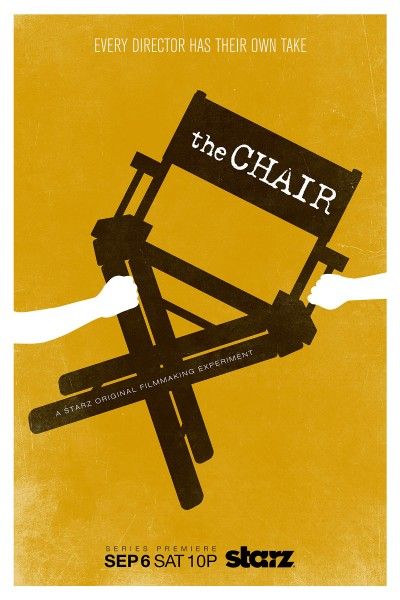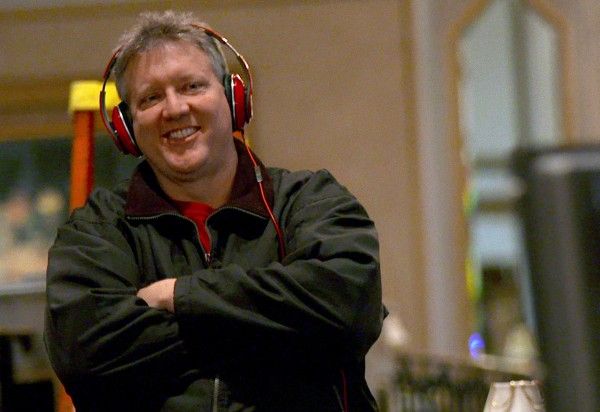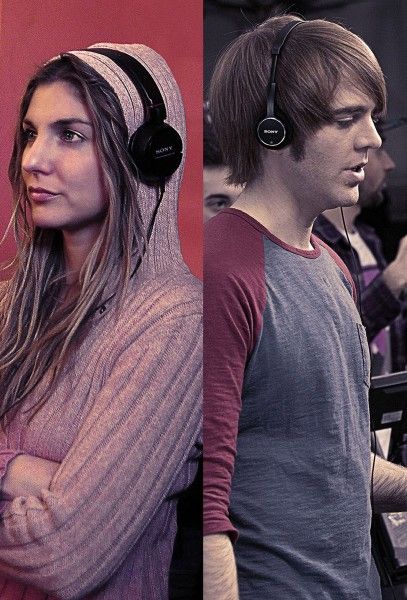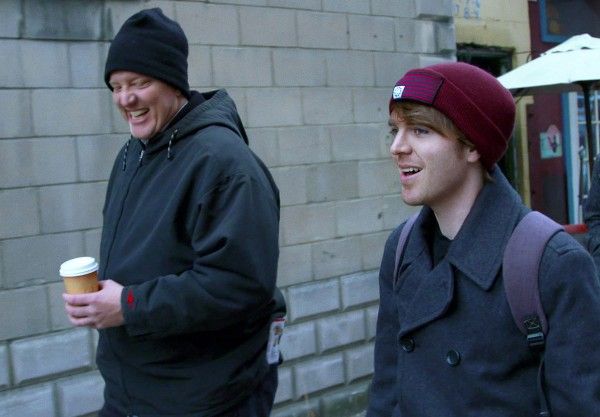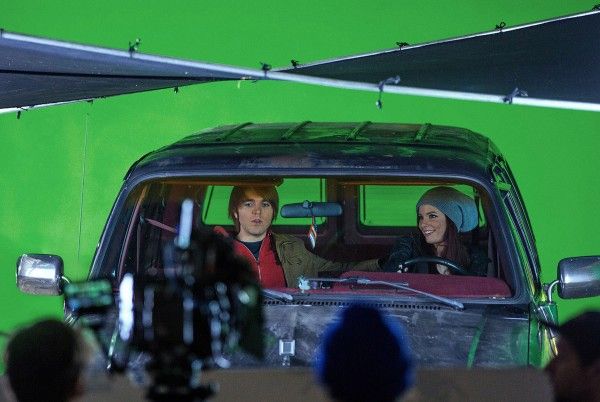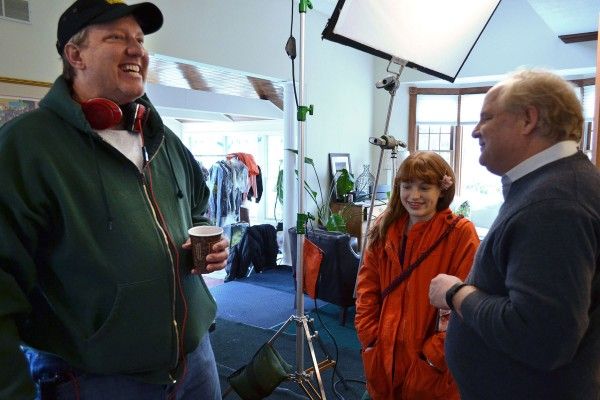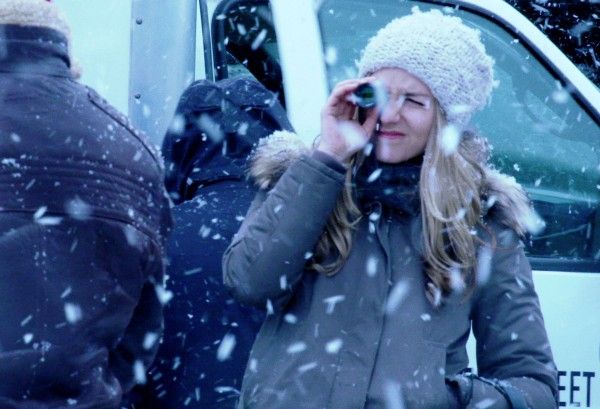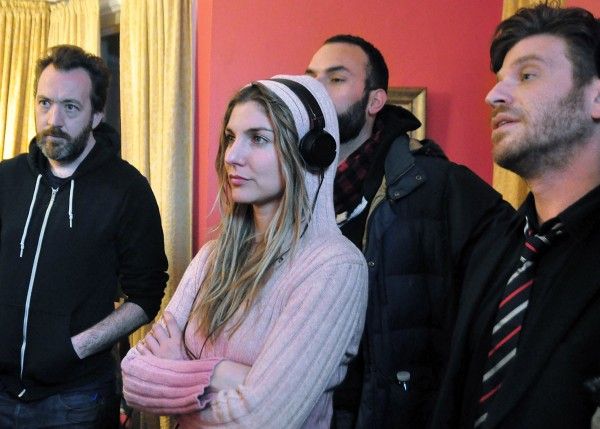Created by Chris Moore (Good Will Hunting, American Pie), the executive producer of Project Greenlight, the Starz original series The Chair is a filmmaking experience the follows two first-time directors who are given the opportunity to direct separate films adapted from the same screenplay. From very different backgrounds, Shane Dawson is one of the biggest comedians on YouTube, with over 10 million subscribers, while Anna Martemucci co-wrote, produced and starred in the feature film Breakup at a Wedding. But through this process, they both have the common goal of making a full-length feature that is uniquely them and something that that can be proud of, and then it’s up to the viewers to ultimately determine which director will be awarded $250,000.
During this exclusive interview with Collider, producer Chris Moore talked about what he was hoping to get from this experiment, how it’s turned out different from what he expected, why audiences have lost their appreciation for professional storytelling versus amateur storytelling, how they considered five different filmmakers before narrowing it down to the two currently in the competition, the challenges of low-budget filmmaking, whether he had to step in with either of the filmmakers, why final cut is such a big deal, what type of professional filmmakers he’d like to see go head-to-head in future seasons, his other Starz TV series Survivor’s Remorse, and the movie he’s currently trying to put together with Matt Damon. He also talked about the time he spent working with Mel Gibson and Michael Mann, before finally deciding on Gus Van Sant to direct Good Will Hunting, and what their version of that film would have looked like. Check out what he had to say after the jump.
Collider: You have two people directing their first feature, which is unbelievably stressful and crazy on its own, but then you have them working with the same source material, which puts them in direct competition with each other. When you set out to do this, what were you hoping to get from the experiment, and how different has it been from what you expected?
CHRIS MOORE: I really wanted to go back and do something in the world of Project Greenlight, to be honest. I’m not going to pretend that I didn’t work on that show. I like that show a lot, and I’m rooting for my former partners on their show. I couldn’t get the rights, when I had the idea for The Chair. I also think it’s a very different idea, where it’s not a script contest or a directing contest. I picked everybody, and it’s an actual contest for the audience to decide who made the best movie. I think that’s the real truth of what we all live under. At the end of the day, we put our work forward, and if people like it, we get to do it again, and if people don’t like it, we struggle.
So for me, that created a situation where I really thought the competition nature of it allows for the audience to see two people making the same decision. In my opinion, that gives you a much better picture of what a director is. I’m a different person now and I know a lot of people that I can call up and say, “What do you think of this idea?” I kept hearing, “Reality is totally different now. You guys were 12 years ago. It’s totally changed. You’ve gotta kick somebody off the f*cking island, every week.” And I didn’t know how you do that in the film world. That takes too long and it’s too expensive. You can’t have five movies, and the person who has the worst cast gets kicked off the first week, and the person who has the worst first week gets kicked off the second week. That sucks. That’s not real, and I’m not interested in that.
So then, I realized that, if you have two and you make it a competition where they can actually win a prize, that kills two birds for me. It addresses this “reality has to be competition” thing, but then it also lets me have the two directors because then you can actually put them next to each other. The only one rule was that they had to keep the names of the characters from the original script, which killed Anna [Martemucci]. In her mind, because she rewrote the script, she was writing it from the point of view that she was recreating these characters and she wanted to give them different names. I got one of her initial outlines, and she was like, “Well, this character is going to become this name.” Because there’s an audience that has to vote, the audience has to understand that Anna cast this guy as Scott, and Shane [Dawson] cast this guy as Scott, and that it’s the same dude. There were little things like that. By seeing two people next two each other, making the same decisions, the audience could learn a lot more.
The second piece of it was that I am a little bit frustrated, as a professional filmmaker, and I use that term loosely since there is no actual definition of it. As a person that’s made a living, for the last 20 years, telling stories with cameras and microphones and visual effects, I think the audience has lost their appreciation for professional storytelling versus amateur storytelling. I’m not against amateur storytelling, but at some point, you’ve gotta say, “F*ck that!” I’m good at what I do. You should f*cking pay to have me tell a story. You should f*cking pay to see Ben Affleck tell a story. You want a guy to carry your movie, hire Matt Damon and f*cking pay for that. If you want to see the college group from Northwestern make a movie, okay, maybe you don’t pay for that. We all owe it to the world to say that there is a difference. I’m always out trying to raise money for content, and then you get these rich guys that go, “Well, that guy made that movie that made $100 million for $50, so why can’t you make your thing for $50?”
First of all, he didn’t make it for $50. Second of all, it didn’t make $100 million. And third of all, because this sh*t costs money. If you are building your new, big house that you’re gonna spend $30 million on, you’re not going to hire some asshole architect that doesn’t know how to design the house. You’re not going to hire a contractor who’s never done it. That’s what you’re buying. If you don’t want professional content, then don’t give me any money. So, part of it is to say, “Audience, if you care at all, there is a f*cking difference, and you should start appreciating that.” I never thought I’d have to say that because, for the last 100 years, people did appreciate it. They would buy movie tickets. They bought DVDs. And then, the internet came and everybody was like, “Everything should be free!” No. It’s not because the technology is expensive. It shouldn’t be free because the people working on it, that’s their job, and they did a really good job.
I’d like people to see the passion, the hard work and the care that real professionals put into it. Even though Anna and Shane are first-time feature film directors, they’ve been making content for four and five years. They know what they’re doing. Maybe The Chair will grow to a place where I can actually get real experienced directors to take on the same thing and go do it. That would be great! It wasn’t designed as a first-time director thing. It was designed as two directors making the same movie. I just couldn’t afford to get experienced directors, the first time. God willing, we get a second season, I’m gonna try to get some real directors. Hopefully, if people see this year and like it, they’ll do it.
How many possible filmmakers did you consider, that were serious contenders, before selecting the two that we see on the show?
MOORE: Five, including the two. I do this for a living, so at any given time, I have a list of directors in my computer or on my phone. If I see something, I’ll write it down. I know that sounds so anal. I come across as so much cooler than I am. I have a list and, depending on the budget level and type of script, there are usually three to six that, right away, I would call because I know I already like their work, or I’ve already worked with them. In this case, it’s a lower budget thing and I knew it was probably going to end up being a first-timer. So, there were five people that I had either worked with as writers or actors, or in some capacity where they indicated that they wanted to be directors and I thought they had a skill set to become directors.
Were you looking for two filmmakers who would not only be interesting individually, but would also push each other?
MOORE: You know, that never occurred to me. At a certain point, when you’re directing, it is all-consuming. Yes, occasionally Shane or Anna would wonder what the other one was doing, but they weren’t really in each other’s heads. They really looked at it as, “I’m gonna go out and make the best movie that I can possibly make, and that I wanna make.” The assumption was that the other one was doing that, too. They interviewed the same crew members, and there were a lot of actors that looked at the scripts when they rewrote them, so they were aware of each other, but there wasn’t really a push factor. I think that’s already there, knowing there’s somebody else out there.
You mention in the show that you hadn’t worked on a low-budget movie in awhile. Were there challenges that you’d forgotten about, having had the luxury of more money, over the years?
MOORE: It’s funny, my daughter asked me that the other day. She was like, “Dad, do you remember everything from all the movies you do?” I hate to say it because it makes me look like the fat, lazy bastard that I am, but you get totally co-dependent on having a staff. You’re used to turning to that third guy when something is going wrong and going, “Hey, dude, run over there and figure that out.” On this movie, you’d turn and there was no dude standing there. You’d be like, “Where the f*ck is the dude? He needs to go fix this.” Everybody is staring at you like, “What are you, an idiot? There is no dude. That’s part of the problem. We don’t have enough guys.” The crews did an unbelievable job. The flipside was that it made me totally jacked up again about how amazing crews are and about how amazing people are that get so much done.
And then, I had to remember what it was like to talk people into sh*t. When you are on a big movie, you walk in and you’re like, “Yeah, Matt Damon is the star and we’ve got $20 million.” That’s not even a big movie by studio standards. And you want to shoot in somebody’s house or their record store or their gallery, or you want to park cars in their parking lot, so you just ask how much it’s going to cost. There’s not a whole lot of, “Listen, I need to park 14 trucks, and we’re going to have catering for 80 people. You’ve gotta let me do it for free, man.” In some way, it was fun to try again. It was really annoying, in certain other ways. You really do get lazy when you can throw money at problems. We’re getting ready to release these movies and put them out, and we’re coming out in good theaters and we’ve got good trailers, but I’m used to conversations like, “How many times is the ad going to run on Comedy Central?” Instead, we’re like, “Is anyone who watches Comedy Central going to know that Shane Dawson made a movie?” They can’t buy ads on TV.
It’s a funny thing where you realize that you’re so dependent on people liking it. This sounds as pretentious as f*ck, but it would be awesome for guys like me, who get lucky because they get to go into bigger movies, to have to go back to this once in awhile. Big corporations have this thing where, every two years, you’ve gotta go to a different department and move around inside of the company. We should be like, “Okay, now it’s your turn, Joel Silver, to go out and produce a $2 million movie,” when normally Joel is getting paid $2 million to produce a movie. I think it would be fascinating. All of us started there. Everyone started with some version of, “Holy, sh*t! I’ve gotta beg, borrow and steal.” I felt a little bit impotent. Normally, I’m a pretty good problem solver, but occasionally a problem would come my way that I thought would be easy to solve, if we had $3 million more. I felt bad, there was one incident with one of the line producers on one of the movies, that just kept coming up, over and over again, and I was like, “I don’t understand how we can be having this conversation. This is the simplest problem on earth to solve.” She was like, “Really? How would you solve it?” And I was like, “What do you mean? Go pay the guy!” And she was like, “Okay, then that means we’re not going to have this.” And I was like, “Wait, what?!” And you realize that you can’t give that guy any money, so you have to figure out how to solve the problem without any money. So, I would say that it is a crutch that you become very used to. There is a part of your brain where you can’t really 100% get back to doing it out of desperation.
You said that you’d love for the show to get successful enough that you could get two professional filmmakers who were willing to do this. Do you have any ideal pairings that you’d love to see compete with each other, just to see how different their take on the same material would be?
MOORE: I do. I have lots of them. What we became fascinated by was people from different genres. If you gave a horror movie to Steven Spielberg and Jim Cameron, you know they’re gonna be different movies, but they’re both really good at those event type of things. But if you took somebody like David O. Russell, who does more dramatic movies, and you gave him Minority Report, and then you went out and had some guy who’s been doing low-budget horror movies, like Marcus Dunstan or one of the guys from the Saw movies, and you were like, “Okay, here’s $100 million. What are you going to do?” Truthfully, there are a bunch of people that have made really cool movies, who I think would be really interesting to take a piece of material. You could also go back to source material, like a novel or a short story or a comic book, and give that to writer/directors and say, “Okay, let’s go do this.” You want to give them enough tools, so you probably can’t talk them into a $900,000 movie or a $600,000 movie. We’ve gotta find a way to make it popular enough to convince people to give them $5 million each. Even though that’s low-budget for these guys, it’s not astronomically low. If it’s super low-budget and it’s two professional filmmakers, the competition is much more about how they use the money wisely, instead of about the storytelling. If you give them enough money, you can turn it into something pretty cool. We’re constantly thinking about it. We’re gonna be ready on the day that everybody decides that we should do it.
Early in my career, I was a young agent and I remember working on Peter Jackson’s team. He had made a bunch of these movies that were horror comedies. He made this one – and I wish I could remember the title – where this guy lifts up his lawnmower and starts mowing down zombies. And then, he had an animated series of movies. I remember, so clearly, people being like, “Well, this guy is just going to be one of those guys.” I just thought he was the sweetest man. He wouldn’t remember me, at all. I was a junior guy, standing there taking notes. And then, he went on to do movies like Heavenly Creatures and Lovely Bones. I just loved The Lord of the Rings movies, and I can’t wait to see the last Hobbit. The thing that people don’t realize is that, if you can tell a good story, you should be able to tell a good story, no matter what the genre is. Gore Verbinski is the guy that did the Pirates of the Caribbean movies, but one of his early movies is Mousehunt with Nathan Lane, about two guys who are trying to catch this mouse. It’s a simple little kids movie, but it was good. I could see how somebody would see that and say, “Well, he could probably do a different kind of movie.” That’s why I’d love to find somebody who’s maybe not already Gore Verbinski, but who’s done the one movie that’s dying to do the other thing. Part of my daily job is picking the right director for projects, but it’s never in the case of who I’d love to see do two versions. I love that we’re already talking about what happens in the second season, but we’re not quite there yet. Hopefully, people will find it as curious as you and I do.
In the show, you talk about how you spent time working with Mel Gibson and Michael Mann, before finally deciding on Gus Van Sant to direct Good Will Hunting. How different would their version of the movie have been?
MOORE: The thing that’s so amazing to me is the sense of humor and comedy of the whole thing. I think I’m so happy that we ended up with Gus Van Sant, and I also did Promised Land with him, is that he’s a guy who takes the script and really figures out how to shoot the script. He doesn’t spend a whole lot of time trying to make it a Gus Van Sant movie. He’s like, “This is the movie I want to make. Let’s go make this movie.” He loved Matt [Damon] and Ben [Affleck], and he loved working with them. I think that was the best way for Good Will Hunting to get made.
Mel has a very strong point of view. Now, he’s seen as more extreme, but he hadn’t revealed a lot of that when we were working with him. He had just won for Braveheart, and he was the most charming, sweet, really funny guy, who really understood what the movie was about. I’ve gotta say, we would have done it with Mel. He ultimately decided, coming off of Braveheart, that there were three or four bigger movies that he wanted to do, which unfortunately still haven’t made it. He wanted to do Fahrenheit 451. I would love to have seen Mel Gibson’s version of Fahrenheit 451.
Michael Mann really wanted to turn it into his own thing, which I think would have been hard. What you see in The Chair with Dan Schofffer, the original writer, Shane embraces him and they work together, but Anna really takes it over and rewrites it herself. With Michael, it probably would have been more him taking over. We would have had no standing. He’s a huge director. We love his movies, but Matt, Ben and I were nobodies. So, in some ways, I’m really glad where we ended up. We obviously made a good version of the movie. I don’t know what the Michael Mann version would be because we never really spent too much time with him. He shot a test that Matt starred in because his biggest concern was, “Could Matt carry the movie?” Ultimately, I don’t know why he passed. Part of it might have been that he didn’t believe in Matt, or whatever. But he ended up walking away, and Mel ended up walking away because he had these other movies. We liked what Mel had to say. Mel was very funny, and he had a lot of stuff that he wanted to get across.
In the first episode, you talk about how you would only step in, if you thought they were doing something totally irresponsible with the money, or if you thought that they wouldn’t be able to turn in a completed film. So, did you ever have to step in, at any point in the process?
MOORE: There were some creative moments where I got nervous that they wouldn’t finish. There was a lot for them to get done. Shane was a little better on the schedule side because he edits in his head. He’s been cutting YouTube videos for so long that, if time got later, he’d know what he’d have to cut. Anna was much more traditional. She’s not inexperienced and she wasn’t making any mistakes, but she was out there trying to shoot everything she could get, every day. So, there were a couple of moments where I was like, “You guys have to finish the movie. You can’t just run out of money without shooting scene X.” Shane has a lot of visual effects in his movie. He’s got a lot of gags and there’s some driving stuff that we did on a green screen, and I had some nerves about the guy they hired because he’s young and I wasn’t sure if he could get all of the visual effects done. But in general, they were both wildly responsible and they had really good teams. The show isn’t really about your average logistical production nightmares. It’s much more about the creative of, “Is this working? Did I get what I was looking for? Is tone coming through?” That’s a little bit more pleasant environment than the logistics of it all.
For people who don’t understand the importance of having final cut for a filmmaker, and especially a first-time filmmaker, can you talk about why that’s such a big deal and why that doesn’t always happen?
MOORE: It’s funny, I’m in a conversation about that right now, on a big movie. Even Dan [Schoffer] and Josh [Shader], who were part of the original script, were super pissed off at me about giving final cut. I tend to do movies with people that I want to do the movie with, so to some extent, the final cut is less of an issue for me because I’ve signed up to do that person’s version of the movie. I’m willing to have screaming fights, in a world where they can ultimately tell me to f*ck off, and then make whatever version of the movie that they want to make. The reason it’s such a big deal is that, at the heart of this, even at the low budget we’re at, we still don’t have all of our money back and we need people to go see these movies. I’m asking them to do something a little crazy. I’m asking them to accept that there’s another person making a version of the movie, at the same time. I’m also asking them to let me film it all, and I’m asking them to be really honest on camera. I think the vlogs that Anna and Shane added to the project make it really special. It feels really honest, and they didn’t have to do that. They had to do a vlogs, but they could have just been like, “All right, it’s day one and it was kinda fun. Bye.” But, they got serious.
So, for all of the compromise that they’re making, starting with a script that they didn’t write and working in this crazy budget scenario and filming in Pittsburgh, which probably wouldn’t have been their first choice, they were at least going to be able to put a movie out that they were proud of and that they really believed in. For me, there was no question in my mind about giving them final cut. We might be able to talk someone who’s not a first-timer into doing it because they don’t get final cut very often. I’ve only worked with a couple final cut directors. It’s very, very hard to get. The money that’s being risked on most movies is so high that the people risking the money want to know that, if the director has gone crazy or they just have a massive disagreement, they can step in and finish the movie the way they think it should be finished. In my professional personal opinion, that isn’t a very successful way to make a movie because the rest of the movie was made by that person’s vision. Sometimes it’s really hard to cut in that last scene that keeps the killer alive, or does something that the studio wants to do, ‘cause it just doesn’t fit the rest of the movie. You sit there and you’re like, “What the f*ck just happened?!” But, that happens. Nobody ever publicizes it or talks about it because they don’t want the audience to know, and directors aren’t allowed to talk about it. Occasionally, there are big public fights between directors and studios, but if you want to work, that’s just not something you do. I think the general audience thinks that most directors have final cut. I think they go into it thinking that that was the director’s version of the movie. When they started to release the “director’s cut” on DVD, the audience started to realize that maybe there’s a different cut, but it didn’t really catch on in a way that people started screaming for the director’s cut.
So, I did it on The Chair because I think it’s the right way, for all that sacrifice and not getting paid any money, to let them know that they’re going to get to put forward this version of their movie. You’ll see, in later episodes, that there are some fights. There were moments that stuff hit that the audience didn’t understand, or that the filmmaker felt something was coming across, but there was no doubt in my mind that it wasn’t. I’m happy to report that we ended in a place where both filmmakers are very excited about their movies, and I like their movies. I’m sure they privately bitch about this or that, but we’re friendly and we didn’t land in some massive fight because I respected it.
Aside from this show, what else are you developing, as a producer?
MOORE: I had a great experience with Starz, and I guess Starz had an okay experience with me, because there’s another show that I did for Starz that comes out on October 4th, called Survivor’s Remorse. It’s about a basketball player that gets his first big contract. It’s about fame, money and family. It’s totally scripted and at a whole other budget level. I love it. I think the show is really good. I think it explores things that people are curious about. I’m very proud of that. And then, I’m working on another project with Matt Damon, that we’re trying to get quickly put together before he goes off to do his big Ridley Scott movie. I’m focusing a lot of effort on that, and on getting The Chair out there.
Does the Matt Damon movie have a name?
MOORE: It does have a name, but given the fact that I don’t have anybody paying for it yet, I don’t want to jinx it. When I have the Kickstarter campaign for the Matt Damon movie, then I’ll give you the name, so you can publicize it.
The Chair airs on Saturday nights on Starz.


